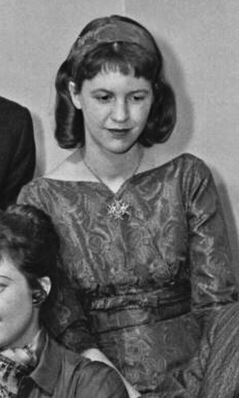|
Though Plath wrote a number of important poems between "Tulips" and "The Moon and the Yew Tree," these poems still fall short of what would become her full brilliance. They describe her struggle to place the experiences she had during her hospital stay in context as she returned to the "Mad Men" day to day world of a wife and mother in America in nineteen sixty-one. What this meant mostly was she couldn't mention her loss of personal identity experiences to anyone, or her poetic ambitions. It was time, finally, by everyone's clock for Sylvia to grow up and be a good mother. She may not be an artist, but she had the honor of being married to a great poet, Ted Hughes, who seemed fated to someday sip wine in a castle, which is what he later did as Poet Laureate to Queen Elizabeth II. But when he was still married to Plath, he was gracious enough to assign her "studies" from time to time to write about. Plath's brilliant poem, "The Moon and the Yew Tree" (click her picture above) is the result of one of the "instructions" that Hughes gave to her, after seeing the moon behind a yew tree outside their apartment window. The poem that Plath wrote at his orders explodes with the mystic visions she'd discovered in "Medallion" and "Tulips." She embraces the "nothingness" of Jung's abyss, the "blackness and silence" of the universe and purely embodies this abyss as the source of creative power. The key is that Plath's poetic self now knows that "blackness and silence" are the sources of creative energy in the universe, the unbroken Is-ness that stays true and sacred despite our often phony lives and self-identities. She's able to spin a myth out of the scene as if by sorceric will. The poem shocked Hughes very deeply. As a poet and an enthusiastic reader of Shakespeare and myth, he recognized that Plath had become a true Seer. He also probably realized she'd been making his meals, sewing on his buttons, and typing his poems while he berated her attempts to write and slept around behind her back. He didn't want any of that to change, but the poem said change is coming. In typical Hughes fashion, he simply shrugged off the poem as a practice piece to Plath's face, but we now know, reading over his posthumous criticism of her poetry and his Birthday Letters poems, how much the poem wounded him and rightly so. As powerful as "The Moon and the Yew Tree" is, Plath was just getting started. Having discovered the creative heart of the cosmos and maybe even her place in it, Plath was ready to step fully into her poetic genius, which she does in the poem we'll look at next Monday, "Lady Lazarus." Poem tally as of today: 8-21-23: Poems Written: 345 Poetry Submissions: 51 Rejections: 25 (15 tiered) Acceptances: 0 Poem written today: "Still Houses" If you're enjoying this series of posts on Plath won't you please consider making a small donation to the cause? https://www.buymeacoffee.com/writerdanQ Donate via: PayPal: [email protected] CashApp: $writerdan Categories All
0 Comments
Leave a Reply. |

